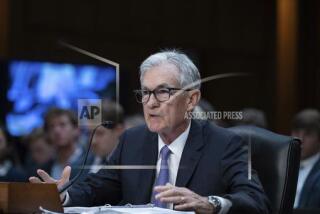Fed nominees slam Wells Fargo for consumer abuses and indicate bank’s growth cap will be tough to lift
Reporting from Washington — Two Federal Reserve nominees on Tuesday slammed Wells Fargo & Co., for its consumer abuses and indicated that they would have to see significant improvements before voting to lift a cap on the San Francisco bank’s growth.
“Just based upon the news accounts, which of course is all I have to go on, the activities of Wells Fargo in this domain are egregious and unacceptable and I was as shocked as anyone to read about it in the newspaper,” said economist Richard Clarida, the nominee to be vice chairman of the Fed, at a Senate Banking Committee hearing.
“If I am confirmed and this matter came before me, as it looks like it would, I would certainly individually want to be absolutely convinced that appropriate steps had been taken and could be verified,” he said in response to questioning from Sen. Jon Tester (D-Mont.).
The other of President Trump’s Fed nominees at the confirmation hearing, Kansas banking regulator Michelle Bowman, said she concurred with Clarida’s answer.
“The actions of Wells Fargo were absolutely inappropriate and I would certainly want to make sure that any concerns are addressed by the bank prior to any discussion,” she said.
Tester had asked them for assurances that they would not support releasing Wells Fargo from the growth cap until “they significantly change the way they do business.”
In February, the Fed board voted unanimously to order Wells Fargo to cap its growth at the $1.95 trillion in assets reached at the end of last year and to improve its corporate governance in response to the creation of millions of unauthorized customer accounts and other consumer abuses.
The consent order required Wells Fargo’s board of directors to submit written plans to improve its oversight and risk management, which it did last month. An independent review by a third-party firm must be completed by Sept. 30 to determine how Wells Fargo is implementing the plans.
Fed Chairman Jerome H. Powell said last week in a letter to Sen. Elizabeth Warren (D-Mass.) that Wells Fargo would have to receive a formal vote from the Fed board before the growth restriction was lifted.
At a March hearing, Warren had objected when Powell said the decision would be made by Fed staff in consultation with the board. Warren pressed Powell to hold a vote so Congress and the public could hold the Fed accountable when it decides whether to lift the stiff penalty it placed on the San Francisco banking giant.
Wells Fargo Chief Executive Timothy Sloan told investors at a conference last week that he expected the growth cap would probably continue into 2019.
Requiring a Fed vote would make it harder for Wells Fargo to get the cap lifted, cutting into the bank’s profits.
A Wells Fargo spokeswoman declined to comment on Tuesday.
Clarida is a respected economics professor at Columbia University as well as global strategic advisor at Newport Beach-based bond giant Pacific Investment Management Co., known as Pimco. He has Washington experience, having served as assistant Treasury secretary for economic policy from 2002-03 and senior staff economist for the White House Council of Economic Advisors from 1986-87.
On Tuesday, former Fed Chairman Ben S. Bernanke and three well-known economic policymakers wrote a letter to committee leaders endorsing Clarida’s nomination.
“Each of us has known Dr. Clarida for many years and has high regard for his academic work and professional qualifications,” said the letter from Bernanke, former Fed vice chairmen Stanley Fischer and Alan Blinder, and Martin Feldstein, former chairman of the Council of Economic Advisors.
But at Tuesday’s hearing, Warren was critical of what she said was Clarida’s lack of experience on regulation. She pushed him to commit that he wouldn’t vote to reduce the amount of capital held by the largest banks amid a deregulatory push by the Trump administration.
Clarida declined, but said he would try to make sure any reduction in regulations didn’t erode the gains in financial stability caused in part by tougher rules put in place by the 2010 Dodd-Frank act.
“I do think there are opportunities to tailor regulations appropriately but an equal priority is preserving the substantial gains and resiliency and stability of our financial system,” he said.
Bowman has been the Kansas state bank commissioner since 2017. She was an executive at Kansas-based Farmers & Drovers Bank, which her great-great grandfather helped charter. She also has worked as a congressional staffer in Washington, as well as at the Federal Emergency Management Agency and the Department of Homeland Security.
She is nominated for the seat on the Fed board reserved for someone with community banking experience.
There are four vacancies on the seven-member Fed board. Another nominee, Carnegie Mellon University economist Marvin Goodfriend, is awaiting a full Senate vote after the Banking Committee narrowly approved his nomination 13-12 in February.
His nomination appears in trouble because Democrats uniformly oppose him as too conservative and Sen. Rand Paul (R-Ky.), a Fed critic, also has said he would vote against confirmation because of some of Goodfriend’s past positions.
Shares of Wells Fargo gained 26 cents on Tuesday to $54.75.
Twitter: @JimPuzzanghera
UPDATES:
2:50 p.m.: This article was updated with Wells Fargo’s closing stock price and the bank’s statement that it would decline comment.
This article was originally published at 9:35 a.m.
More to Read
Inside the business of entertainment
The Wide Shot brings you news, analysis and insights on everything from streaming wars to production — and what it all means for the future.
You may occasionally receive promotional content from the Los Angeles Times.











